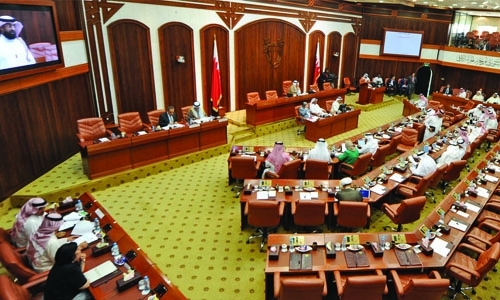Bill to shed expats above 50 rejected
Manama : The House of Representatives yesterday rejected a controversial bill that proposed to cease recruitment of expatriates above the age of 50 and to dismiss those who have already exceeded the age limit. The rejection came as the majority of MPs voted against the bill after a heated debate in the House.
Their votes came in consistence with a report issued recently by the Services Committee in the council, which rejected the bill after reviewing it with a number of authorities including the Labour Market Regulatory Authority, Bahrain Chamber of Commerce and Industry and two labour unions. The first supporting voice to the bill was Abdulhameed Al Najjar, who called for passing the proposal despite the panel rejecting the proposal.
He said that the proposal serves enhancing the efficiency of recruited workforce and would reflect positively on both the health and security sides.
First Deputy Speaker of the House, Ali Al Aradi, stressed that the proposal contradicts with the simplest international labour conventions and agreements.
“Retirement age is internationally between 60 to 65 years. We are not talking about informal employees here,” Al Aradi said.
He commented, “It’s also known that in the private sector establishments, especially in the fields of investment, finance, economic and consultancy, the experience of the employee is important. If we ban employers from recruiting workers above 50, we will harm these vital sectors of the economy. This proposal isn’t benefiting the Kingdom.” A similar opinion was shared by the Head of the Legislative and Legal Affairs Committee, Mohammed Milad, who supported Al Aradi saying that the private sector isn’t regulated by mandatory retirement, similarly to the public sector.
Protect citizens
In reply to the MPs rejecting statements, Jalal Kadhim, who’s one of the presenters of the bill, justified it, saying that there are Bahraini consultants and people with long experience in different fields, implying that not only expats are the ones who have long work experience.
Kadhim said, “This is our right as citizens. Similar laws are implemented in fellow Arab and GCC states, where foreign workers’ age is limited to 40 years. This includes Saudi Arabia and Kuwait. We annually have new Bahraini graduates in different specialisations and fields of work.”
“We are the representatives of the people of Bahrain and it is our duty to protect them and create job opportunities for them. There are more than 26,000 expats working today in government establishments. They occupy jobs that are typical to the specialisations of unemployed Bahraini graduates. Additionally, there are 514, 000 non-Bahrainis working in the private sector, with an average of five expats for each citizen. In the House of Representatives, we respect the rights of foreigners, but our priority is to protect the rights of citizens,” Kadhim added.
Some MPs such as Ahmed Qarata and Isa Al Kooheji called for amending the proposal to include certain professional categories that may endanger employees above 50 years of age, mentioning the fields of construction and radiation.
Meanwhile, MP Adel Al Assoomy highlighted that “Bahraini employees should be well-trained to compete with the foreign employment”, adding that “expats are recruited because their experience is needed and they have no competition from the national workforce, which lacks the necessary experience in some fields”.
Walkout
The committee merged two bills in its report. The first was the one stipulating the age limit, while the second one called for giving LMRA the authority to reject or accept work permits of expats in accordance with their age and the nature of the jobs they are applying for.
Following the heated discussion, MPs Mohammed Al Maarifi and Abdulrahman Bumjaid called for separating the two bills, as “both serve different purposes”.
However, the MPs voted for the committee’s report and rejected both proposals. Kadhim walked out of the session after the voting process was completed.
Related Posts







